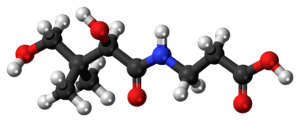
Ball-and-stick model of the pantothenic acid molecule, the most common form of Vitamin B5. Key: Carbon-black, Hydrogen-white, Oxygen-red and Nitrogen-blue. Jynto, Wikimedia commons.
There is limited knowledge about the about the immunoregulatory effect of Vitamin B5, pantothenic acid, on the innate and adaptive immunity. Unlike Vitamin B5, vitamins A, C and D have been shown to play an integral role in the regulation of immune responses and contribute to clearance of pathogens. Vitamin D, for example has been shown to play an important role in induction of autophagy and cytokine production in macrophages. Collaborative research between researchers from China and United States, aimed to determine if Vitamin B5 has any regulatory effects on innate and adaptive immunity in a mouse model of Mycobacterium tuberculosis (M.tb) infection.
Oral administration of Vitamin B5 to M.tb infected C57BL/6J mice resulted in increased levels phagocytosis and M.tb growth inhibition by bone-marrow derived macrophages (BMDCs) compared to control mice. Vitamin B5 adminstration was also associated with increased BMDC activation, determined by significantly higher expression of CD80, CD86 and MHC-II compared to control mice. They also showed the vitamin B5 treatment of BMDCs preferentially induced expression of pro-inflammatory cytokines, TNF-α and IL-6, but not anti-inflammatory cytokines, IL-4, IL-10 and IL-13.
To determine if vitamin B5 was also associated with lower bacterial burden in vivo (lung and spleen), He et al., compared bacterial load between Vitamin B5, Isoniazid and placebo treated mice. Though vitamin B5 treatment was associated with lower lung and spleen mycobacterial burden than placebo treated mice, reduction of mycobacterial load was not comparable to antibiotic treated mice. He et al., also showed that Vitamin B5 was able to promote proinflammatory cytokine, IFN-γ and IL-17, production by CD4 T cells.
In summary, this article showed that Vitamin B5 is able to potentiate proinflammatory innate and adaptive immune responses in M.tb infected mice. This data suggests that administration of Vitamin B5 can potentially improve therapeutic management of tuberculosis.
Journal Article: He et al., 2018. Vitamin B5 reduces Bacterial growth via regulating innate immunity and adaptive immunity in Mice infected with Mycobacterium tuberculosis. Frontiers Immunology
Article by Cheleka AM Mpande











